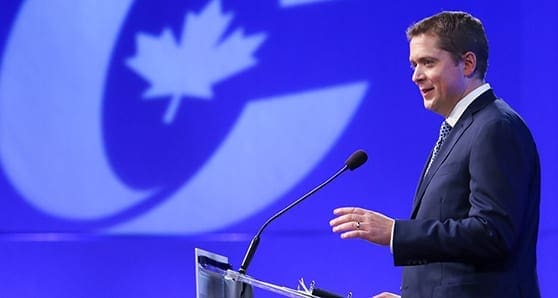 Here’s an amusing trivia question. Who was Andrew Scheer’s only media endorsement for the federal Conservative leadership?
Here’s an amusing trivia question. Who was Andrew Scheer’s only media endorsement for the federal Conservative leadership?
Me, according to a master list compiled by Wikipedia.
What do you know? The old war horse still has it!
I’m just having some fun. I’ve made some good political predictions and some bad ones over the years – but this is one of my best.
There’s a flip side to my (somewhat) finely-tuned soothsaying skills. Although I felt Scheer was the best candidate, I wasn’t confident he had enough support to beat Maxime Bernier.
The general feeling was Bernier would win comfortably if he was above the 30 percent threshold after the first ballot. When the results came in on Saturday, the Tory MP and former cabinet minister was only at 28.89 percent. Scheer, a Tory MP and former Speaker of the House (2011 to 2015), was close behind at 21.82 percent.
Over the course of 12 ballots, Scheer chipped away at Bernier’s lead – and finally beat him on the 13th ballot by a minuscule margin of 50.95 to 49.05 percent.
How did this happen?
Several factors were at play.
Kevin O’Leary’s decision to drop out and endorse Bernier didn’t produce the effect many observers expected. The controversial businessman was the acknowledged frontrunner when he unexpectedly pulled the plug on his bizarre campaign, but it clearly hadn’t translated into strong numbers beyond first-choice supporters.
Hence, the love-hate relationship that many Tories had with O’Leary didn’t disappear when he shifted his allegiances to another candidate.
Bernier’s libertarianism hit a wall with the party faithful. His fiscal policies, including opposition to corporate welfare and phasing out supply management, resonated with Canadian conservatives. His social liberalism, including support for abortion and gay marriage, may have appealed to millennial voters and Red Tories but turned off the vast majority of party supporters.
While there’s been a recent global trend to choose leaders with fiscal principles and centrist social values, Canada’s Tories bucked the trend to an extent.
The party’s social conservative wing, which is about one-third of the membership, flexed its political muscle. They didn’t like Bernier’s social views, so they supported other candidates. This enabled former Tory MP Pierre Lemieux to finish seventh with 7.67 percent (only 0.07 percent behind Kellie Leitch), and Tory MP Brad Trost to finish a surprising fourth with 14.3 percent. Many of them would eventually park their votes with Scheer, a fiscal and social conservative by political persuasion.
If you actually think social conservatism is dead in Canada, think again.
Scheer’s sensible conservative vision was correctly viewed as the natural continuation of former prime minister Stephen Harper’s political legacy. The new Tory leader believes in small government, targeted tax credits, scrapping the carbon tax and cracking down on crime. He takes a balanced approach on social issues, respecting the views of all party members and opposing the need to re-open debate related to abortion and gay marriage. Finally, he wants to re-establish a more muscular foreign policy, and get Canada back into the fight against the Islamic State and radical Islamic terrorism.
In other words, if you were pleased with Harper’s ideas, there would be little reason to be displeased with Scheer’s. While there are some policy differences, both want to create a positive, forward-thinking and inclusive conservative vision for Canada.
Scheer has a challenging road to electoral success. He isn’t a well-known political figure, and needs to increase awareness of his name and policies. His political rivals are already trying to paint him as the purveyor of some sort of (wait for it) hidden agenda. As well, Prime Minister Justin Trudeau remains a popular leader in the eyes of many Canadians.
Fortunately, Scheer has time on his side – and a chance to make political history, and his own place in political trivia, in 2019.
Michael Taube, a Troy Media syndicated columnist and Washington Times contributor, was a speechwriter for former prime minister Stephen Harper. He holds a master’s degree in comparative politics from the London School of Economics.
The views, opinions and positions expressed by columnists and contributors are the author’s alone. They do not inherently or expressly reflect the views, opinions and/or positions of our publication.


